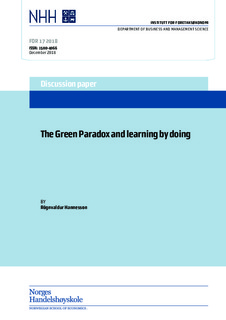The Green Paradox and learning by doing
Working paper

Åpne
Permanent lenke
http://hdl.handle.net/11250/2577808Utgivelsesdato
2018-12-13Metadata
Vis full innførselSamlinger
- Discussion papers (FOR) [566]
Sammendrag
Production of a renewable substitute to fossil fuels is modeled as causing the cost of this backstop technology to fall over time in proportion to the scale of the substitute production and how long it has been in use. The unit cost of resource extraction is assumed to rise as the stock is depleted, so learning by doing will increase the reserves permanently left in the ground. The green paradox can nevertheless be present, in the sense that the resource extraction path can initially lie above what it would be in the absence of a parallel production of renewable energy. In a monopolistic market, the resource monopolist’s optimal price path is two-phased, even with inelastic demand. In the limit-pricing phase, the price is falling, due to the progressive learning by doing effect, and the extraction path is rising.